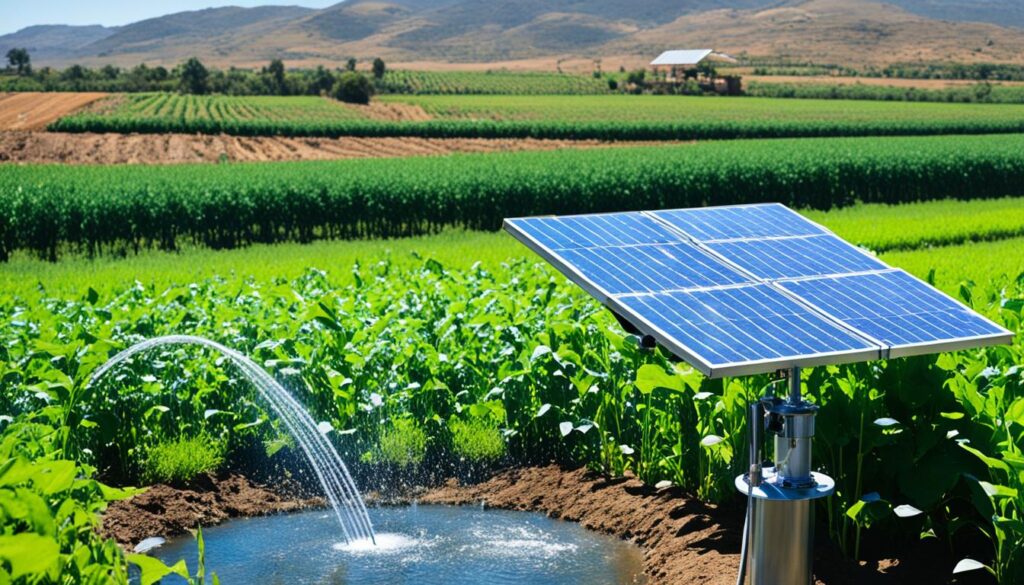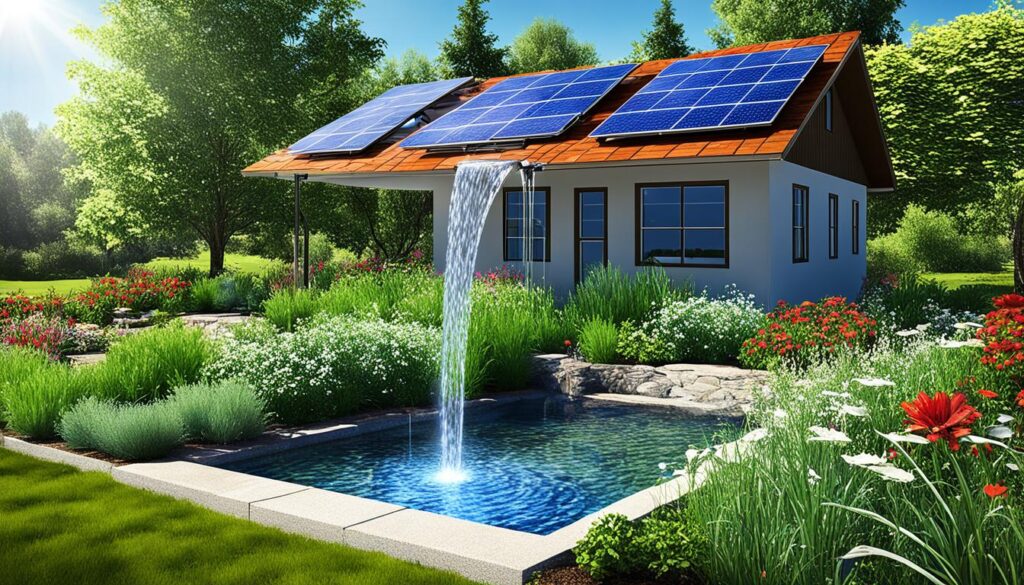Solar-powered water pump are revolutionizing the way we meet our irrigation and water supply needs. With the global market for solar pumps on the rise, it’s crucial to understand the benefits and options available for eco-friendly water pumping solutions.
In this article, we will explore the rise of solar water pumps in sustainable agriculture, the advantages they offer, and how to choose the right solar water pump for your specific application. We will also dive into the economic viability, installation, operation, and maintenance considerations, as well as the need for quality control and water management.
By the end of this article, you will have a comprehensive understanding of solar water pumps and their environmental impact, equipping you with the knowledge to make informed decisions for your irrigation needs.
Key Takeaways:
- Solar water pumps provide an eco-friendly alternative for irrigation and water supply needs.
- Solar-powered water pumps offer cost-effectiveness, reliability, and reduce dependence on fossil fuels.
- Choosing the right solar water pump involves understanding your specific application requirements.
- Evaluating economic viability, installation, and maintenance considerations is crucial for successful implementation.
- Eco-friendly water pump contribute to sustainable agriculture and environmental conservation.
The Rise of Solar Water Pumps in Sustainable Agriculture
Advantages of Solar Water Pumps in Agriculture
Solar agriculture water pump have become increasingly popular in sustainable agriculture due to the numerous advantages they offer. These eco-friendly water pumps are powered by renewable energy from the sun, making them a sustainable and environmentally-conscious choice for farmers.
Here are some key advantages of using solar water pumps in agriculture:
- Cost-effectiveness: Solar water pumps provide a cost-effective solution for farmers as they eliminate the need for costly electricity or fuel. Operating on solar power, these pumps can significantly reduce operational costs for farmers, allowing them to invest their savings back into their farming operations.
- Reliable water supply: Solar water pumps ensure a reliable water supply for irrigation, even in remote areas with limited or no access to the grid. These pumps can operate efficiently using solar energy, providing a consistent water source to meet the irrigation needs of crops.
- Reduced dependence on fossil fuels: By utilizing renewable energy from the sun, solar water pumps reduce the reliance on fossil fuels. This not only contributes to a greener and cleaner environment but also reduces carbon emissions, helping combat climate change.
- Increased crop yields: Proper irrigation is crucial for achieving optimal crop yields. Water pump for irrigation enable farmers to efficiently water their crops, ensuring adequate hydration and improved growth. The consistent water supply from solar-powered pumps can lead to higher crop yields and better quality produce.

By adopting solar water pumping systems, farmers can benefit from lower operational costs, increased crop yields, and reduced carbon emissions, making it a sustainable and eco-friendly choice for agricultural water supply.
Choosing the Right Solar Water Pump for Your Application
Evaluating and selecting the appropriate solar water pump for your specific application is crucial to ensure efficient and reliable water pumping. By considering factors such as system functionality, economic viability, installation requirements, and water management, you can make an informed decision that meets your needs and maximizes the benefits of renewable energy.
Understanding Solar Water Pumping Systems
Solar water pumping systems operate by harnessing the power of the sun to generate energy for pumping water. These systems consist of photovoltaic (PV) panels that convert sunlight into electricity, which then powers the pump to draw water from a source and deliver it to a desired location.
Understanding the components and functionality of solar water pumping systems is essential in choosing the right pump for your application. Key components include:
- Solar panels: These capture solar energy and convert it into electricity.
- Controller/inverter: This regulates and converts the generated DC electricity into AC power for the pump.
- Motor/pump set: This is responsible for drawing water and delivering it to the desired location.
- Storage tanks or reservoirs: These store water for later use or maintain a steady water supply.
By assessing the water requirements and understanding the dynamics of solar water pumping systems, you can choose a pump that meets the demands of your specific application.
Evaluating Economic Viability and Cost-Effectiveness
When considering a solar water pump, evaluating its economic viability and cost-effectiveness is essential. Factors to consider include:
- Initial investment and payback period: Assessing the upfront cost of the system and estimating the payback period based on energy savings and water production can help determine the long-term financial benefits.
- Operational costs: Solar water pumps have lower operational costs compared to traditional pumps due to the absence of fuel or electricity costs. Understanding the potential savings in terms of energy consumption and maintenance can contribute to cost-effectiveness.
- Subsidies and financial incentives: Researching available subsidies and financial incentives for solar water pump installations can help offset the initial investment and further enhance the economic viability of the system.
By conducting a thorough economic analysis and considering the long-term benefits, you can select a solar water pump that provides both environmental and financial advantages.
Installation, Operation, and Maintenance Considerations
Installation, operation, and maintenance requirements are crucial considerations when choosing a solar water pump. Key points to keep in mind include:
- Site assessment: Evaluating the installation site for factors such as solar irradiation, shading, and the availability of water sources is essential to optimize the system’s performance.
- System sizing: Properly sizing the solar water pump system based on water requirements and solar panel capacity ensures efficient and reliable operation.
- Maintenance and troubleshooting: Understanding the maintenance requirements and troubleshooting procedures for the pump, panels, and associated components will ensure smooth operation and longevity of the system.
By addressing these installation, operation, and maintenance considerations, you can ensure a successful and hassle-free implementation of your solar water pump.
Quality Control and Water Management Essentials
Ensuring the quality of the solar water pump system and effective water management are essential for optimal performance and durability. Consider the following:
- Choosing reputable brands and suppliers: Selecting high-quality components and reputable brands will enhance the reliability and longevity of the system.
- Water storage and distribution: Proper water storage and distribution infrastructure must be in place to optimize water management and prevent wastage.
- Monitoring and control: Implementing real-time monitoring and control systems can help track the performance of the pump and detect any issues promptly.
By prioritizing quality control and effective water management, you can ensure the longevity and efficiency of your solar water pumping system.
Conclusion
The adoption of solar water pumps has a significant environmental impact, making them a crucial component of sustainable agriculture. By harnessing renewable energy, these eco-friendly water pumps reduce carbon emissions while providing efficient irrigation solutions. Through the use of solar-powered water pumping systems, farmers can contribute to a more sustainable and environmentally-friendly future for irrigation practices.
The Environmental Impact of Adopting Solar Pumps
Solar water pumps play a vital role in reducing the carbon footprint of agricultural activities. By utilizing solar energy as a power source instead of fossil fuels, these pumps eliminate greenhouse gas emissions, such as carbon dioxide. This reduction in carbon emissions is a crucial step toward combating climate change and preserving the environment for future generations.
Anticipating the Future of Eco-Friendly Irrigation
The future of eco-friendly irrigation looks promising with the widespread adoption of solar pumps. As the demand for sustainable agriculture practices continues to grow, farmers are increasingly turning to renewable energy water pumps. The use of solar-powered water pumping systems not only reduces greenhouse gas emissions but also promotes economical and efficient agriculture, leading to improved crop yields and increased water conservation efforts.
India, as a prominent agricultural nation, has a unique opportunity to lead the way in the adoption of solar water pumps. By embracing this technology, Indian farmers can contribute to a more eco-friendly and sustainable approach to irrigation, ensuring the availability of water resources for future generations. With the increasing affordability and advancements in solar technology, the future of solar water pumps in India’s agricultural sector is bright.
FAQ
How do solar water pumps work?
Solar water pumps work by harnessing energy from the sun to power a pump, which then moves water from a source to a desired location. They typically consist of photovoltaic panels that convert sunlight into electricity, which is used to run the pump. These systems are designed to be efficient and can operate even in areas with limited access to electricity.
What are the benefits of using solar water pumps in agriculture?
Solar water pumps offer numerous advantages for agriculture. They provide a cost-effective and reliable water supply for irrigation, reducing the reliance on fossil fuels. This not only helps farmers save on operational costs but also contributes to a cleaner and greener environment. Additionally, solar submersible water pump can lead to increased crop yields and reduced carbon emissions.
How do I choose the right solar water pump for my application?
To choose the right solar water pump, it’s important to understand how solar pumping systems work and evaluate their economic viability and cost-effectiveness. Consider factors such as your specific water pumping needs, installation requirements, operation and maintenance considerations, as well as quality control and water management essentials. Consulting with experts can also help ensure the successful implementation of a solar water pump for your application.
What is the environmental impact of adopting solar pumps?
Adopting solar pumps has a positive environmental impact. Renewable energy water pump reduce carbon emissions by decreasing reliance on fossil fuels. They contribute to sustainable agriculture practices, helping to promote a cleaner and greener environment. By choosing renewable energy water pumps like solar-powered water pumps, individuals and farmers can actively participate in creating a more sustainable water pumping system.
What does the future hold for eco-friendly irrigation?
As the world becomes more focused on sustainable solutions, the future of eco-friendly irrigation looks promising. Solar water pumps and other renewable energy water pumps will likely continue to play a significant role in agriculture. By adopting these eco-friendly solutions, farmers can contribute to a more sustainable and environmentally-friendly water pumping system, ultimately leading to a more sustainable future for irrigation practices.

